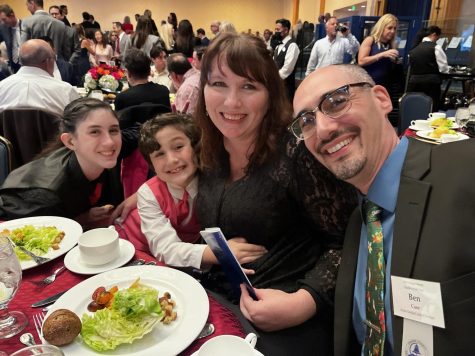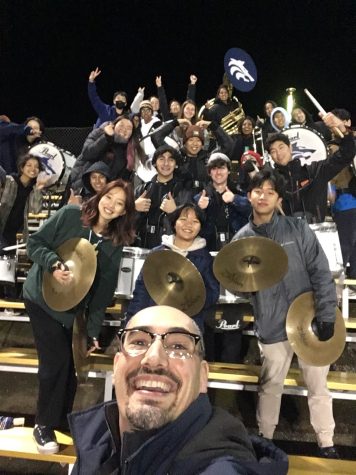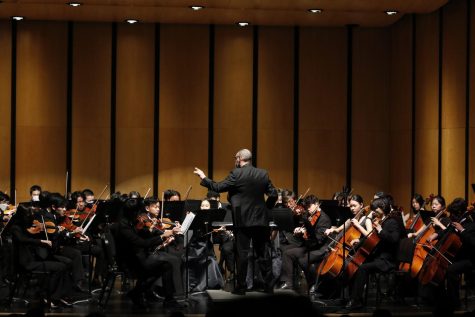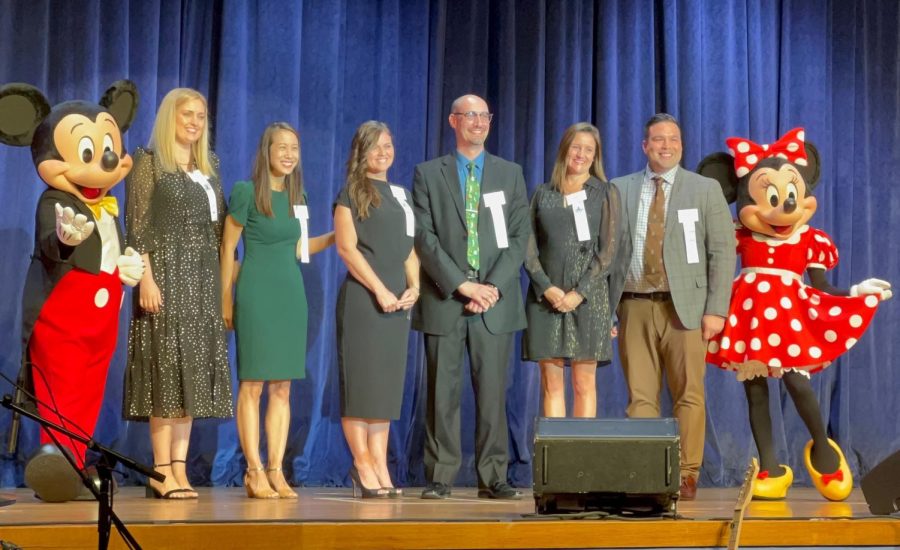TOT(all)Y AMAZING: Northwood music director Ben Case (center) is among five recipients of 2023 California Teacher of the Year. He’s pictured here at the Orange County TOTY banquet in October.
An educator’s true purpose: A look into Ben Case’s journey as a music director
Northwood’s instrumental music director Ben Case added to his numerous recognitions as a distinguished educator this past October when he was acknowledged as one of the six California Teacher of the Year recipients. On a windy Friday evening, amidst the discordant harmony of beginning brass players outside his office in Room 501, Case shared his journey of his personal pursuit in music, unveiling a refreshing perspective on his key role inspiring younger generations to appreciate the beauty of music.

The Howler: Mr. Case, you seem to be very involved in improving education, beyond just the local level. Even before your recent recognition as California Teacher of the Year, I noticed that you were selected as the Grammy Music Educator Award semifinalist in 2015, followed by the Irvine Unified School District and Orange County Teacher of the Year awards in the past few years. Could you describe what that process for applying for Teacher of the Year looked like?
Ben Case: To be completely honest with you, it was a pretty complicated process. Dr. Brad Van Patten—who was the founding director here at Northwood High School and now the director of all arts programs in Irvine—nominated me for the district teacher of the year. So once I was selected for that, the next step was to apply for the county. Then from that, so on and so forth. When I was going through that, in the application process, it was reflective in putting out all my thoughts, philosophy and beliefs about education. It was very authentic and if anything, I wasn’t trying to be anything other than myself. I was trying to express how I feel about teaching and why I show up every day.
TH: How long exactly have you been teaching?
BC: It is my 17th year teaching at Northwood. This is my first full-time teaching job, but before I taught here, I was directing one of the bands at Cal State Fullerton as a graduate student there. I was also working with a few other high schools in Orange County, just as a coach, where I would just come in to direct the orchestras, bands and marching bands and help out with some rehearsals. So I’ve been in front of groups for close to 20 years, but this is my 17th year here at Northwood.
TH: Wow, that’s a long time. In your time studying music at Cal State Fullerton and coaching, how did you know you wanted to pursue a serious career in music? Particularly as a high school music director?
BC: I think I always knew that I wanted to get into education. I always knew, even going back to elementary school and middle school, that this was something that I wanted to do. I didn’t always know I wanted to teach music, but education, in general, is really big in my family. My dad used to be the director of the College Career Center at Cal State Fullerton and my mom was a children’s librarian, helping children with special needs and learning disabilities. When I was in high school, although music had been something that I have been passionate about all my life, I was torn between teaching music and teaching tech theater. It wasn’t until I got the job at Northwood that I started seeing my future at the high school level and getting to be that access point for students who are still trying to figure it out. I don’t expect all these guys to be music majors, but if I can kind of light that spark of passion by showing all of my students, regardless of what ensemble or what they play, that they can see and interact with the world through that artistic lens, it is really powerful. And if there is someone who is struggling to find their direction, being that trusted adult to have those conversations and discuss possible opportunities and passions and help them find their way is a job that is impactful more than you can describe.
TH: That is so inspiring to hear and it’s so interesting to see what life has to offer in its unexpected changes. On the topic of your career, I noted that you are also chair of the Art Department at Northwood High School. What does having that sense of responsibility look like?
BC: I think there is a certain level of service mentality that I bring and one of the things that I have been most fortunate to do is to work with other teachers. I can also lead philosophical conversations about what we can all do to create better artistic experiences. I’ve had a lot of “professional development,” where I have been doing meetings for my colleagues all across the district and becoming able to all grow in the name of growing our educational community, regardless of what we teach.
TH: Your purpose and philosophy for education seem to be a prevalent theme in your career. Adding onto what you just mentioned, I noticed during an interview with the Orange County Register, you told them, “I do not teach MUSIC. I teach STUDENTS.” Could you elaborate more on that mantra?

BC: Sure. When I started 17 years ago, I was focused on being that college director. I was passionate about music, working with high-level ensembles and pushing them to higher limits and levels. But really, it only took the first or second year in the high school classrooms to see what information I have to offer: I’m not teaching content, I have to teach the students that are in front of me, where I can use that content, which for me, is music and I use it as a vehicle to empower to students and get them excited about the content and see what they are capable of doing. But it starts with the relationships and ability to teach students, getting them on the same page, that is the focus, to build that trust and level of vulnerability, where then we can take the academic risks of playing music and trying things. That will come across really expressively in a performance that we never would have been able to do if we were just playing notes on a page. And that mantra you mentioned, I have been telling my student teachers that for years and during the pandemic, that rang true.
TH: The pandemic brought a lot of challenges to many different areas of education. What impact did it specifically have on music education?
BC: I mean, when everything shut down in 2020, it wasn’t really about music. It wasn’t about the performances we couldn’t do; I mean all those performances were canceled, but these kids were still there. So I could either mourn the lost performances or I can address the student needs and we can all, yes, be sad about it, but more importantly, move on to do the things that we need to do for them to work through the problems. And I think as a teacher, that’s one of my core responsibilities to not just teach the music, but to teach the kids and supply whatever it is they need to find success.
TH: Thanks for sharing. It is so inspiring to hear from teachers who always strive to provide their students with better opportunities. And those ideas you mentioned of pushing through can be seen through the various student music activities that you’ve contributed to, like the district’s annual Band Spectacular. I read that you are kind of the mastermind behind it. Is that true?
BC: [Laughter] I wouldn’t call myself the mastermind. It’s truly a group effort. So Dr. Van Patten, the same director who opened up the school, started this whole thing. But back then, it was a much smaller experience since a lot of schools weren’t around. And ever since then, it’s been able to grow from a much smaller event to now this huge community event, which ends up being one of the largest collaborations in the district. And we do it in collaboration with the other high schools, including University High School music director Corey Heddon, who handles a lot of the behind the scenes planning, and with our booster programs, of course. 1,500 students performing with the district superintendent, the mayor and council members all come out for it just because of its huge visibility. And the superintendent mentioned to me how much he loves this event. He asked me how many students were participating in this event and I answered 1,500. That’s 1,500 different stories. That’s 1,500 different people with their own passions, lives and pursuits, but they’re all out there together, working on the same thing. It’s hard to imagine any other event where you get that level of collaboration.

TH: How do you feel when you see these hundreds of students gathering together in one place chasing a unified passion for music?
BC: It’s exciting. It’s really exciting because as I mentioned before, my focus shifted from teaching music to teaching the students and seeing that level of collaboration and interest. This year was especially special not just because we were able to come back from years off, but because my daughter was an eighth grader playing percussion in the middle of the field. So it hit home not just as a music director coordinating that event, but also because I got to connect with my family and see my own daughter benefit from these experiences.
TH: What are some programs or ideas you hope to see in the coming years for future generations of young musicians, like your daughter, all across the district?
BC: It’s nice seeing these musical opportunities come back and seeing all disciplines with a certain level of learning loss, where we’re still trying to backfill some lost information and get students caught up. But seeing the level of excitement in students: That’s exciting. So getting to engage that attention and student focus on those opportunities and their interests is our first interest.
TH: And lastly, circling back to your initial purpose for helping shape the students’ interests in music, what advice would you give to these young musicians?
BC: I think the biggest thing that comes to mind when finding interest in music is that you don’t have to be a music major to have music in your life. You don’t have to be an arts major to have that in your life and be able to benefit from it. This stuff is for everybody. Art is for everybody. And if you take chances to pursue your interests, you can find your passion. But I think especially at Northwood, we are so fortunate to have such a strong arts program here, that sometimes I wish I could just be a high school student all over again, just to be able to take these brilliant courses. There are so many opportunities for kids to get involved. So I’d say, just give it a try. Give it a shot.
